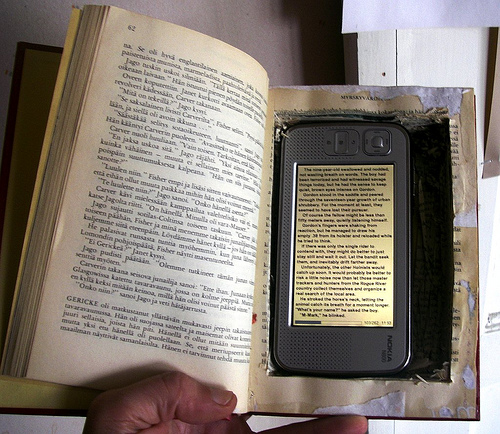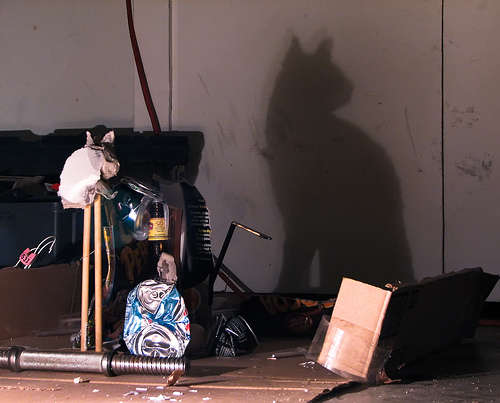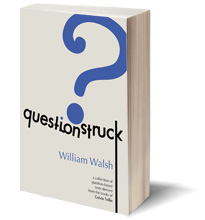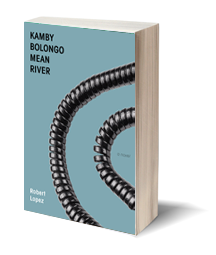The Ipod as Writing Tool (Don’t Worry This is a “Clean” Post)

My Ipod’s become an instrumental (ha ha) part of my writing.
Charles Simic said something like “Chance is the key that gets me out of the prison of myself. Well, then in this way and in others also, my Ipod’s a key.
First, I use it to generate poems. I record bits and pieces and save the files on to my Ipod, organizing them into appropriate playlist. Bits of the news, pieces from magazines. Bits of fiction and pieces of poetry. Things I’ve heard people say. Descriptions of landscape. Whatever. Etc. Then using the Ipod’s shuffle feature I generate 10-12 piece units (the number can and does of course vary). This is a starting point block of text that I then manually edit on the page.
I also use my Ipod for editing pieces that I think are done or close to. I record these pieces and put them on a playlist. Then (in bed or walking around or using the bathroom–damn, this was supposed to be “clean”–etc etc) I listen to them and make the edits in my head.
When I’m stuck manually revising and need a bit of color for example (like Jean Follain said) I’ll use the Ipod’s shuffle to generate me plenty of word/phrase/image options from which to choose. And then I’ll play around with those “colors” and see if I can make something work.
Of course I also use the Ipod to listen to music while writing or revising.
And the Ipod’s also useful when I’m organizing a book or chapbook. I put the poems (pieces) in a playlist and then using the Shuffle I get these strange and sometimes useful sequences that I would have trouble coming up with on my own. And, in the end, I sometimes use some of these orderings the machine creates. At the very least it’s amusing.
I’m wondering who else may be using the Ipod in similar ways. Or differently?
And I’m also interested in knowing what other methods of chance composition you guys (and gals) may be using to lead you out of the prison (or into the labyrinth) of the self.
(Simic I think just used to randomly take books off the shelf and open them to random pages. And sometimes did this with James Tate. Perhaps in the nude, with pastries. Perhaps.
Damn, this was going to be “clean”!!!)
Why Are Books Nice?

A nice article by Stephen Marche in the WSJ kind of responds to Nicholson Baker’s complaints about the Kindle. Marche provides an aside about a 15th-c scholar named Trithemius who wrote “In Praise of Scribes” and argued against the newfangled printed book. Trithemius thought that
[p]rinted books could never match the beauty and uniqueness of a copied text; copying produced a state of contemplation which was spiritually beneficial; and copying was a way of reducing error, which indeed it was at first. His central claim was that hand-produced books were inherently holy. His leading anecdote is the story of a scribe who died after decades of copying texts. When they disinterred him, the three fingers of his right hand, his writing hand, had not decomposed. Anyone who has held a handmade medieval missal—or even a handwritten letter—knows what Trithemius is talking about: the sense that someone is communicating something to you personally.
Obviously Trithemius lost the battle against print, and so too now will books be printed less and less and downloaded increasingly. But I think Trithemius is still instructive. Defending an old thing, and arguing against a new thing, requires a clarification of values. This idea about the state of contemplation produced by transcription particularly ignited me, and encourages me to do the thing more where I copy out other people’s sentences and lines.
Now let us praise the printed book, or try to. Marche somewhat cattily says that Baker’s argument “boils down to how much he likes the feel of paper.” Maybe so, but in any case I think it could be useful to think more about what we like about printed books. As e-readers like the Kindle proliferate, what do we want to preserve? Lots of complaints about Kindle boil down to weaknesses in the technology. Like, eventually e-readers will be much easier to flip through, and write in, use the index of; and the quality of photos and art will be like on computers soon enough. For my part, I’m holding out until I can take it in the bathtub, where I do 40% of my reading at least.
But what are the things that are nice about books that the technology could never accommodate? Is it just the feel of paper and the weight of the book? Or how you feel proud when you look at the bookshelf and see all that you’ve read? Marche writes, “Why are so many writers so afraid of this staggeringly wonderful possibility?” I wouldn’t say I’m afraid, but I still want to write books that are printed, and I still want to read books by other people that are printed. Marche’s article has prompted me to try to figure out why. Any ideas?
Waiting for Gato

cat shadow sculpture
Instructions on writing a piece called “Waiting for Gato.”
1. Google an excerpt from Waiting for Godot
2. Using ‘find and replace’ MS function replace “Godot” with “Cat.”
3. Use online translator to translate from English into Spanish.
4. Replace non-verbal sounds with “meow.”
Sam Lipsyte on WTF. (Updated a little.)
httpv://www.youtube.com/watch?v=Up0IP9fQu9Q
Marc Maron, a pretty damn funny comedian and former Air America broadcaster, has moved his ranty, neurotic brilliance to a podcast called WTF.
Most of the time, he spends the “interview” portion of the podcast talking to fellow comedians, but a recent episode featured a writer I assume is beloved by Giant readers: Sam Lipsyte.
A couple of highlights. Maron at one point says: “I’ve asked you, when you’ve started novels, what it’s about, you’re like ‘I don’t know, I’m working around these two sentences.'”
And discussing Lipsyte’s lack of a website, and FSG’s suggestions that Lipsyte get a little more online savvy to help sell a few books, Sam says: “They can’t order you to tweet. It’s not that kind of society yet.”
An in-depth, craft-based writing discussion? Nah. Who the hell wants that all the time. Instead its two friends talking and making each other laugh. Sam also reads from his upcoming novel, The Ask. It’s worth it for that alone. READ MORE >
‘May that godforsaken show burn in hell.’
One of my favorite things about The Onion is how often its content cleverly deals with books, reading, literature, authors, whatever. I think we’ve linked to a bunch of those stories/articles before, so I won’t do that now, but I did want to send you to this recent opinion bit by ‘LeVar Burton’ about his time hosting Reading Rainbow.
Look, Reading Rainbow was a television program. That should tell you something right there. What I should have done is hosted a show that taught children how to watch more television. I bet they would have come up with the funding to renew that show.
What I hadn’t realized is how long Reading Rainbow lasted. According to Wikipedia, “the show ceased airing reruns on PBS on Friday, August 28, 2009.” Damn.
RIP, Reading Rainbow. I have fond memories of tuning in to watch you as I sat on the floor in front of our television and sipped Kool-Aid from my sippy cup.
R.L. Stine in the house

Jovial Bob!
Around this time last year, I was assigned a story for work that involved me checking out local haunted houses and evaluating their various levels of scarytude. Easy enough. There was a wrinkle, though. I was to have a pair of dauntless companions—in this case, beloved Goosebumps author R.L. “Jovial Bob” Stine and Peter Gilmore, current high priest of the Church of Satan (you really can’t make this stuff up).
The other day, I came across some Goosebumps-related Internet ephemera, and realized that I still had R.L. Stine’s email address, which I then used. Stine, author of a bazillion books and a known Wodehouse enthusiast, was gracious enough to answer a few of my questions.
I remember when you and I went out Haunted Housing last year, that you mentioned loving the Kindle? Could you briefly talk about how that happened? Doesn’t it feel kind of blasphemous?
I don’t think it’s blasphemous at all. I think the object is to get people reading. Does it really matter what package or device they use to read? This isn’t mine—I forget where I saw it. But someone wrote: What if we’d been using the Kindle for the past 300 years, and some guy came along with a new thing he invented, called a book. We’d laugh at him. We’d say: “But it only has one story!” “You can’t change the type size!” “You can’t download any more stories into it!” “It’s too heavy to carry!”
I still prefer a book, but the eReaders have a lot to recommend them, especially if they catch on with young people.
Presumably, then, you’re comfortable with technology. I have to admit, though, that I didn’t see R.L. Stine iphone apps coming. How’d that happen?
I think I was one of the first children’s authors to do an online chat, back when it was hard to do, and maybe six kids would show up. I’ve always loved messing around with technology. But I also think it’s important to go where the kids are. My web site—rlstine.com—has all kinds of fun stuff to get readers involved. And my new iPhone app— R.L. Stine’s Haunted House of Sound—seemed like a really fun way to reach my readers.
Here at HTML Giant, we style ourselves as the “internet literature magazine blog of the future.” Is this how you pictured the internet literature magazine blog of the future?
I have to admit I never pictured the internet literature magazine blog of the future until I checked out HTML Giant. Reading through the blog was kind of like being on Mars. All these authors I didn’t know! A lot of it seemed to be from a different planet, which of course, is why it’s so enjoyable.
How’d you stay so prolific over the years? Has your approach to writing varied in that time?
I don’t think I can quit. I wouldn’t know what else to do all day! I don’t think my approach to writing has changed at all. Someone described writing as an “addiction,” and in my case, I’m pretty sure it’s true!
Friday Fuck Books, Let’s Watch an Old Movie
httpv://www.youtube.com/watch?v=eBto_xnz2tw
That’s the opening to the movie WAX: The Discovery of Television Among the Bees.
Watch the whole movie here on WAXWeb, where the film exists as a hypertext document.
According to the New York Times, WAX was the first movie on the internet.
David Blair, the filmmaker, combines found footage with his own scenes and narration to tell the story of a beekeeper interested in the dead.
Those familiar with Craig Baldwin’s movies—like the wonderful Tribulation 99 or the copyright infringement celebration that is Sonic Outlaws—might enjoy Blair’s movie, too.
Someone on IMDB said:
“i gave it 3/10 and even that’s a gift. the strange thing is that i can’t keep myself from suggesting certain people see it. hopefully you’re not one of them. the quality is impossibly bad yet somehow some elements sort of stuck in my brain. if you figure out what that’s about, let me know?”
So, there’s a recommendation for you. If you figure out what the movie is about, let that person know.
Who Deserves What?

New York Times best-selling Anteater?
When you think about it, the title of this post really asks two questions. The answers, as near as I can tell, are, respectively, nobody and nothing. But Felicia Sullivan (author of The Sky Isn’t Visible From Here and former everything-in-chief of the venerable & lamented Small Spiral Notebook) isn’t so sure. Over at her blog, she takes on what she calls “the culture of entitlement” within the literary world today. Then, in the comments section, Rachel Fershleiser (of Housing Works, Smith magazine & co-editor of the Six Word Memoir books) raises some questions about the assumptions underlying the arguments of the post. Things get pretty heated pretty quick, between the two of them and a third commenter named Les, who seems more interested in critiquing Rachel’s grammar than listening to what she says. (Felicia, on the other hand, dives in head-first). It’s an interesting back and forth between two smart people (and Les), who actually seem to be talking TO each other at least as often as they’re talking PAST each other, which in internet-thread terms is basically a miracle of loaves and fishes. I am still sorting out my exact thoughts about this debate/discussion, but forget about what I think for a second. WHAT DO YOU THINK?
Standing books

 Books have been virtually standing up lately, endowed with a visual girth which reflects the meatiness inside. I like this idea, but it does make me wonder: why does a medium inextricable with 2D wanna play 3D? Is it a marketing thing? Like a representation of the actualization of having the physical book in one’s hands? Or is it simply the flourishes of photoshop’s capacities? Here are two books from Keyhole and Dzanc. One notices they are rendered with the same template. (I actually first thought they took a picture of the book.) I often wonder, “is the actual book that thick?” That’s a meaty 600 page-ish thickness.
Books have been virtually standing up lately, endowed with a visual girth which reflects the meatiness inside. I like this idea, but it does make me wonder: why does a medium inextricable with 2D wanna play 3D? Is it a marketing thing? Like a representation of the actualization of having the physical book in one’s hands? Or is it simply the flourishes of photoshop’s capacities? Here are two books from Keyhole and Dzanc. One notices they are rendered with the same template. (I actually first thought they took a picture of the book.) I often wonder, “is the actual book that thick?” That’s a meaty 600 page-ish thickness.
On “e”

e-cigarette
There’s something very strange and non-ironic about the Electronic Cigarette, a cigarette shaped device which mimics an actual cigarette using electronically vaporized liquid nicotine, rechargeable battery, and pressure sensors. (Check out these companies here, here, and here.) I can’t figure out if E-Cigarettes are supposed to help you quit smoking, or to exploit the gestural and oral flourishes of smoking, or simply to deliver nicotine without the other harsh elements to your body and/or environment. I won’t get into the culture of smoking — its hegemony of rebellion and corporately endorsed counter-culturalism — but rather, investigate the prevalence of this “e” prefix.
